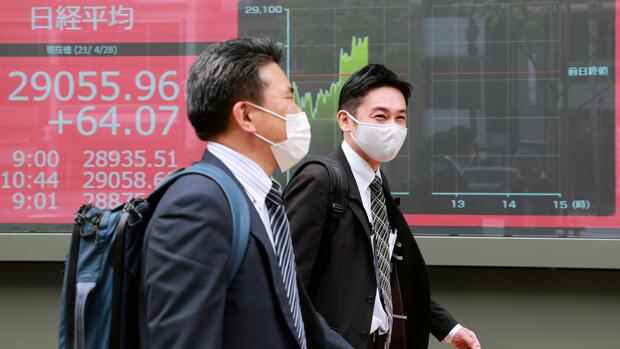Investors in Japan are enjoying a one-month high.
(Photo: dpa)
Frankfurt, Tokyo The relief over the outcome of the parliamentary elections in Japan brought the Tokyo Stock Exchange the largest price jump in more than four months. The Nikkei index rose 2.6 percent on Monday to 29,647 points.
The ruling LDP of Japanese Prime Minister Fumio Kishida lost seats in the election, but defended its absolute majority. “This means that the stock exchanges can also hope for the future with an expansive financial policy in the form of large economic packages,” said portfolio manager Thomas Altmann from the investment advisor QC Partners.
Nomura shares fell 6.3 percent against the trend in Tokyo. Due to the equivalent of 295 million euros in write-offs on transactions in the USA from 2007 and 2008, the brokerage company’s quarterly result fell short of expectations. He did not see this write-off coming, said analyst Hideyasu Ban of the investment bank Jefferies.
The Chinese stock exchange in Shanghai, on the other hand, hardly moved and was at 3544 meters. Disappointing economic data and the resurgence of the coronavirus pandemic weighed on the mood here.
China’s industrial activity grew faster in October than it had done in four months. This was helped by stronger demand, but energy shortages and rising costs weighed on production, a company survey on Monday found.
Top jobs of the day
Find the best jobs now and
be notified by email.
The Caixin / Markit Manufacturing Purchasing Managers’ Index (PMI) rose to 50.6 in October – its highest level since June. Analysts polled by Reuters had expected the index to remain unchanged from September at 50.0. The 50 mark separates growth and contraction on a monthly basis.
“The manufacturing sector recovered slightly in October compared to the previous month. However, downward pressure on economic growth persisted, ”said Wang Zhe, senior economist at Caixin Insight Group. Supply bottlenecks, rising raw material prices and power supply problems have led to severe restrictions for manufacturers and interrupted the supply chains.
The Caixin survey, which focuses on smaller, export-oriented companies in the coastal regions, showed an increase in domestic demand. But foreign demand has remained sluggish as the pandemic continues to rage in many countries. The incoming orders sub-index rose to 51.4 from 50.8 in September, while new export orders fell for the third month in a row.
According to a Reuters poll, economic growth in China will weaken from an expected growth of 8.2% this year to 5.5% in 2022. In the first three quarters of 2021, the economy grew by 9.8 percent compared to the previous year.
More: Despite disappointing figures from Amazon and Apple, the record hunt on Wall Street continues.
